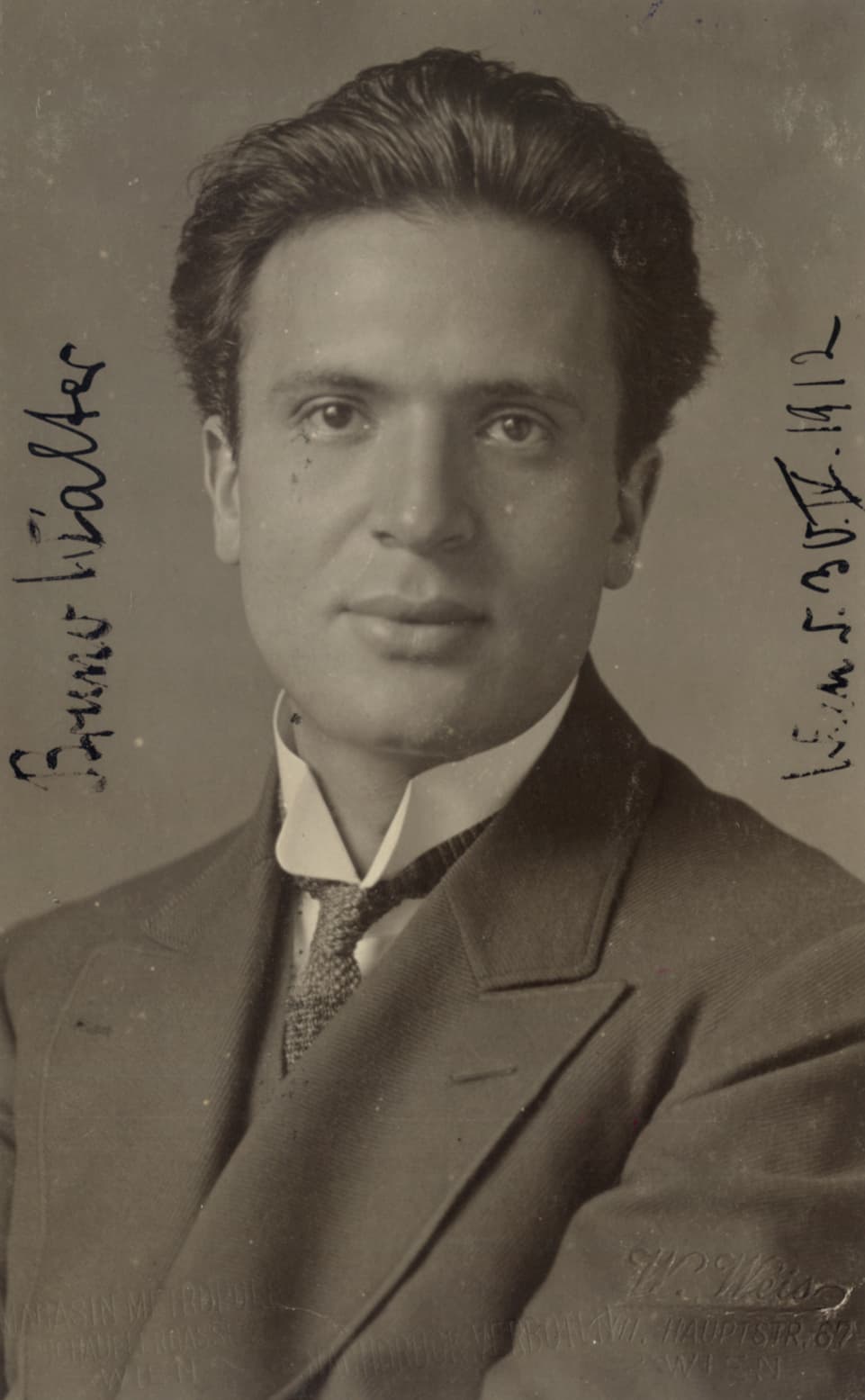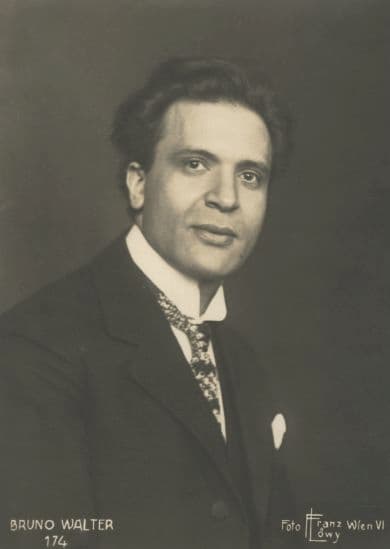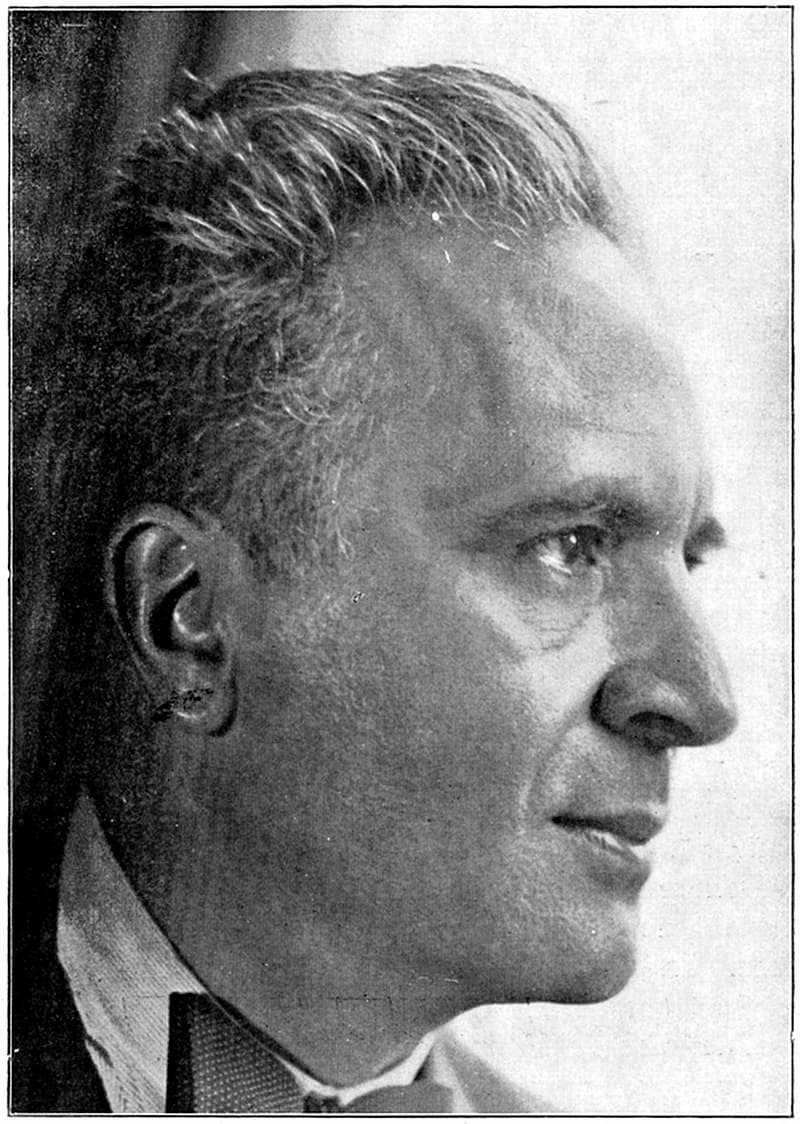Bruno Walter [Schelsinger], born on 15 September 1876 in Berlin, is celebrated as an outstanding conductor in an era of great conducting. He worked closely with Gustav Mahler and held major positions in Europe and the United States. His work is documented in hundreds of recordings made between 1900 and 1961. Walter hated routine performances and always strove to present a work “as if it were receiving its world premiere.” Walter is widely considered one of the great conductors of the 20th century.
Bruno Walter Conducts Mozart’s Berlin 1933
Berlin Childhood

Bruno Walter, 1912
Walter was born into a middle-class Jewish family, and his father was a bookkeeper in a large silk factory. As Walter recalled, “he was a quiet man, thoroughly reliable and conscientious, who, out of business hours, lived only for his family.” On occasion, his father would attend a play or an opera and later hum melodies from operas and operettas to his son. Apparently, young Bruno was particularly delighted with Rocco’s aria in the first act of Fidelio.
His mother had an unmistakable musical talent, which she had started to develop as a student at the Stern Conservatory. She was an accomplished pianist “and sang songs by Schubert and others in an agreeable small voice.” The family owned an upright piano, and Walter recalled, “I can see myself, a little child, standing at its side and listening enchantedly to Mother’s music.” On holidays, the family went to the synagogue, and young Bruno was enchanted by the “pure choral chants and the solemnity of the strains of the organ.”
Gustav Mahler: Symphony No. 5 in C-Sharp Minor – IV. Adagietto (New York Philharmonic Orchestra; Bruno Walter, cond.)
Musical Examination

It was obvious from the very beginning that Bruno had great musical aptitude, and it was predicted early on that he would become a musician. His mother gave him his first piano lessons, but his talents quickly outgrew his mother’s teaching ability, and a young pianist by the name of Konrad Kaiser was engaged to take over. As Walter writes in his autobiography, “I gained my first exciting impression of pianist brilliance,” and after one year, Walter submitted to an examination by Robert Radeke, Conductor at the Berlin Royal Opera and co-director at the Stern Conservatory for Music.
Walter meticulously remembered this particular examination as Radeke first tested his ears. He had to turn around and call out the tone played on the piano, singly at first, then in consonant chords, and finally dissonances. Then, he had to play unfamiliar pieces at sight and, finally, works of his own choosing. He remembers, “I played a movement from a Mozart sonata and two of Mendelssohn’s Songs without Words and was told to improvise for a few minutes. Radeke quickly pronounced judgement, “every inch of him is music.”
Ludwig van Beethoven: Symphony No. 6 in F Major, Op. 68, “Pastoral” (Vienna Philharmonic Orchestra; Bruno Walter, cond.)
Stern Conservatory

Bruno Walter, 1937
As a young student, Walter loved to improvise. Apparently, his dreamy improvisations all had songlike qualities in the manner of Chopin or Mendelssohn. And, he started to compose. As he writes in his autobiography, “I covered innumerable sheets of music with compositions of all kinds, but none of those sonata movements, nocturnes, impromptus, fantasies, and songs seemed in any way remarkable to me when I looked them over later. Here and there, among the many barren ears, there was a fertile one.”
Bruno Walter was admitted to the Stern Conservatory at the age of eight and studied piano with the conductor and former assistant to Hans von Bülow, Franz Manstädt, and theory with Ludwig Bussler. His piano studies progressed meteorically, and he was admitted to the class of the distinguished pianist and music historian Heinrich Ehrlich. In 1889, he performed the first movement of Beethoven’s Piano Concerto No. 2 at a student concert with the Berlin Philharmonic.
Johannes Brahms: Symphony No. 3 in F Major, Op. 90 (New York Philharmonic Orchestra; Bruno Walter, cond.)
Public Debut
His official debut took place on 12 February 1890, when Walter played the Moscheles E-flat Major Concerto with the Berlin Philharmonic. He did receive good reviews, but Walter was still unhappy as he was passionate about composition and was looking to be both a creative and recreative artist. Walter had composed a duo for violin and piano at the age of nine, and he began composition lessons with Radecke at thirteen. In addition, he loved going to the opera house and preferred absolute music, and he soon became a regular audience member of the Berlin Philharmonic.
Walter’s life-changing moment arrived in the shape of Hans von Bülow. Walter recalled, “I saw Hans von Bülow conduct the Philharmonic Orchestra in a classic programme. Previously, I had paid hardly any attention to the conductor. Now, however, I saw in Bülow’s face the glow of inspiration and the concentration of energy. I felt the compelling force of his gestures, noticed the attention and devotion of the players, and was conscious of the expressiveness and precision of their playing… That evening decided my future.”
For more of the best in classical music, sign up for our E-Newsletter
